#go metas
Text
Metatron's Tie
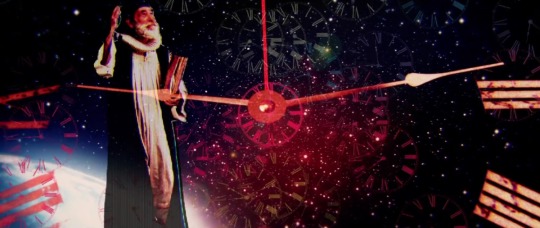
**Update: check the reblogs. There's a clear picture that shows the tie pattern as flowers. So, there goes my theory. Whomp whomp. Easy come, easy go, as Freddie says. @archangelween @drconstellation
People, I have been trying to get a good look at the Metatron's ding dang neck tie since September to determine what those little blue symbols are. Because, like everything in the Good Omens universe, I believe it's been put there for a reason. I also believe that God has no idea what she's doing, which is why she hired Neil Gaiman to run things for a few decades.
Despite being a so-called agent of Heaven, the Metatron's costume is coded as demonic, from his dark topcoat to the black stripes on his white shirt. The item I find most fascinating, however, is his tie. And this is probably in large part because I've had so much difficulty seeing the subtle blue pattern upon it and that has made my brain itch and made me hyperfixate. As one does.
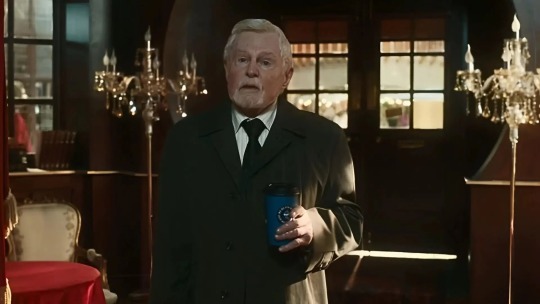
I think I may have figured out the design, and it complicates all my Metatron theories, but here we go. The Metatron's tie is black, featuring a repeated small bright blue symbol throughout. I've guessed it could be a star or a planet. A cryptic sigil or maybe something to do with the coffee (I'm not a coffee-theory person, though, for the record.) I don't know what it is (well, maybe I do now, and I promise we'll get there in time...I'm a demon of my word), but I do know that it's important.
All the angels have references to their angelic status concealed within their costumes.
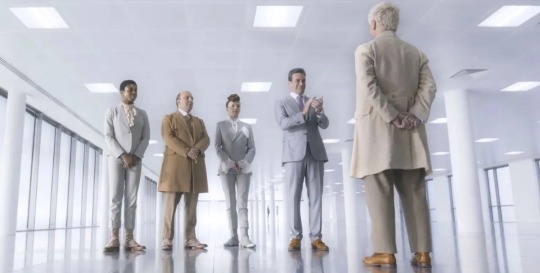
Michael is the watcher. She is the one who, in Saturday Morning Funtime, delivers surveillance photos to Gabriel. To reflect this, Michael wears a gold ring featuring several small pearls that symbolize eyes. She is ever-vigilant (hyper-vigilant, ya might say), and even has a contact in Hell (Dagon) to broaden her scope of observation. The placement of the ring in the pinky is also significant. A good watcher mustn't themselves be observed, so Michael, in her role as observer must slip under the radar. This corresponds to the pinky finger being small and quite literally underhanded, as in at the bottom of the hand.
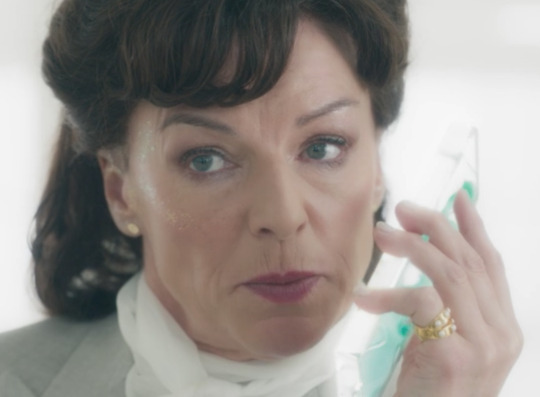
Uriel's ring is a silver star, worn on her/their index finger, the digit associated with authority. (We call it the index finger because we use it to sort and catalog, creating meaning and order.) Uriel certainly commands authority, both in their overall calm and assured demeanor, and also in their actions. It is she who physically confronts Aziraphale prior to the S1 No-pocalypse, easily inspiring fear in the Principality. As for the symbol of the star, I believe it is a reference to modern Angelography (I might have made up that word, but I think you know what I'm talking about) which usually describes Uriel as a sun, star, or the flame of the Almighty.

Sandalphon's symbology is two-fold: a thick gold pinky ring featuring a pair of circles (kind of looks like a lego brick, to be perfectly fair) and that small gold grill he wears on his front teeth. Both these items are the most elaborate pieces of angelic adornment that we see. Sandalphon's overall aesthetic is much warmer than the other angels', leaning toward caramel and tan rather than dove gray. He's a bit of an odd ball in the host of Archangels and stands out based on his wardrobe choices alone. He's also the only Archangel not to return in S2. I don't want to make too much of this, because there are many in-universe reasons why we may not see Sandalphon again. However, in Judeo-Christian scripture, Sandalphon is closely joined with...wait for it...the Metatron, with apocryphal texts describing him as Enoch's (the Metatron's pre-angelic human name) twin brother. I take this with a hefty spoon of salt, though, since Neil definitely plays loosey-goosey with these dogmas and even the scriptures themselves are a veritable soup of contradiction. (The Bible is not a static or universally canonical text, and Hebrew scriptures, outside the Tanakh are a web of activity and debate as to what is accurate. I'm not here for the arguments today; this is not my Bat Mitzvah.)
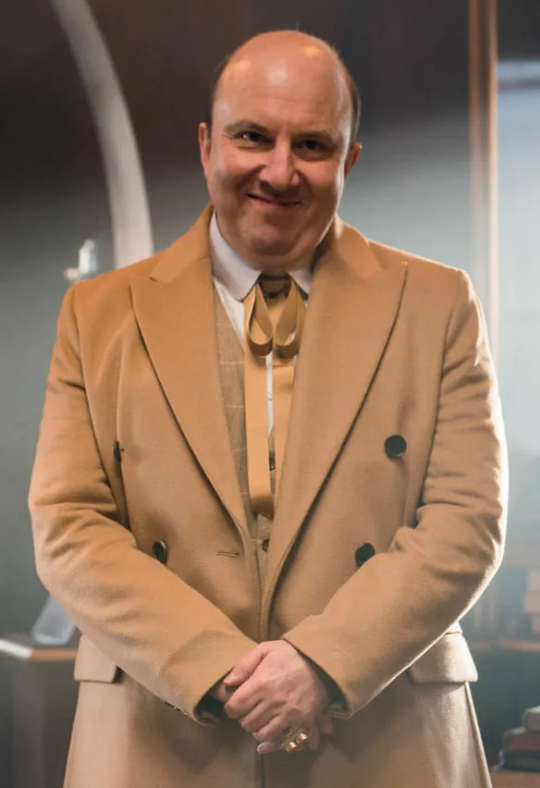
Finally, we have Gabriel, the only Archangel who doesn't wear a ring. He does, however, wear a watch. I have two thoughts about the watch. First, clocks are thematically relevant in the Good Omens universe. From the grandfather clock in the bookshop to Crowley's elaborate wristwatch (which he has in both show and book) to the opening sequence of S1, which has far too many clock faces to count. So there's that. But holding time in one's hand (or on one's wrist) is a powerful metaphor that illustrates control and higher power. To possess a clock is to command time and space which are essentially inseparable. As the Supreme Archangel, Gabriel is nearly the top-ranking being in the universe (for a time, at least...see what I did there? pathetic laughter) and his wristwatch demonstrates this point.

If you're still with me, you're doing great. Good job.
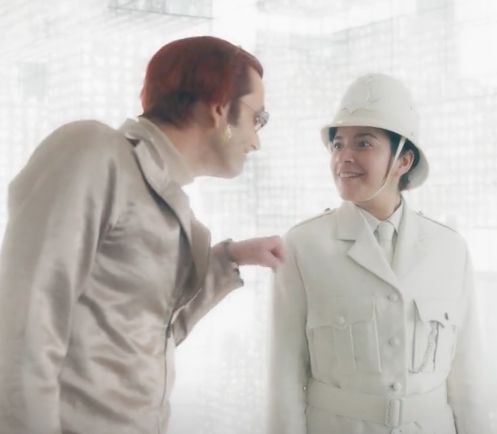
We've got to see how important the Archangels' symbology is to their characters, I think, to really understand why the sigils on the Metatron's tie matter. So, finally to the point. Dolphins. Thanks for coming to my TED Talk.

To move forward, we'll need to call upon my old friend, the Tarot deck. Cards, in general, and Tarot, in particular, play a marked role in the GO universe. The Almighty Herself addresses the viewer in the opening lines of the show, "God does not play dice with the universe; I play an ineffable game of my own devising. For everyone else, it's like playing poker in a pitch-dark room, for infinite stakes, with a Dealer who won't tell you the rules, and who smiles all the time." As God speaks, cards appear on screen, and some of those are from the Rider Waite Tarot deck. One specific card that caught my eye in this montage is "Judgement."
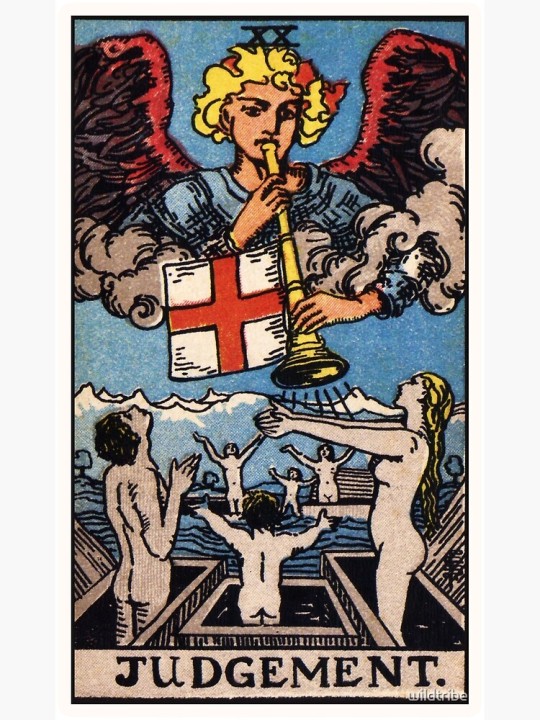
This card features an angel blasting a trumpet and waking the dead from their graves on the Day of Judgement. The angel on the card is not named, as such. It's usually assumed to be Raphael, as he is the angel who is prophesied to call and raise all souls on this day. However, I've found other references naming the angel as either Gabriel or the Metatron. Now, I don't want to get overly carried away here, but in the context of Good Omens, reading the Judgement card with the Metatron as the angel pictured may actually make a lot of sense, and clarify the sigils on the Metabutt's tie. The Metatron postures himself as the Voice of God--the Mouthpiece of the Almighty. Kinda like a trumpet, yes?
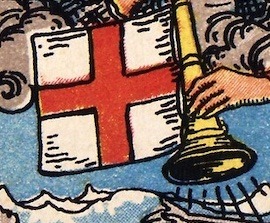
Now look at the flag on the angel's trumpet. That's called St. George's Cross and it's a very prevalent European Christian symbol dating back to the Middle Ages. Like many images in the Tarot, it's a heraldic emblem that has meaning outside the deck, often associated with bravery and military might. It continues to be used in military iconography into the present day. The Judgement that the angel heralds is not peaceful. It's a call to war. The righteous will be gathered to Heaven and the wicked will be destroyed--a repeat of the first Great War in which Satan and the demons were cast into Hell. In the narrative of Good Omens, this war will bring about the end of time, the end of the world, and the beginning of eternity (hope ya'll like The Sound of Music.)
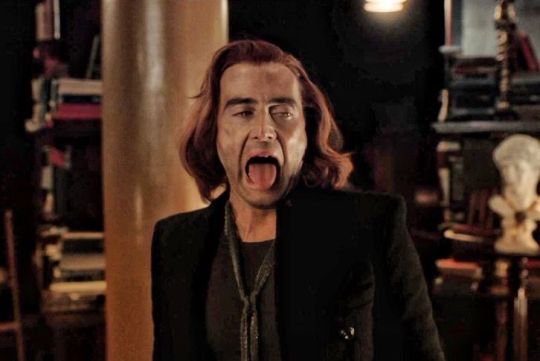
Kids (human and goat, alike) I think those little blue sigils on the Metatron's tie are Saint George's Cross. (I'm so sorry this is so small and hard to see. Now you know my pain.)
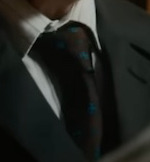
In the Final Fifteen, the Metatron speaks briefly about the Second Coming, which is a reference to Saint John of Patmos' prophecies--you might know them as the Book of Revelation. Some Christians interpret Revelation as an upcoming final judgement for humanity. And it seems, based on in-universe exposition, certain characters view these prophecies in a similar light. In the reverse body-swap at the end of S1, Crowley suggests that the averted Apocalypse was not the end of the conflict. "If you ask me," he says, "Both sides are gonna' use this as breathing space before the Big One. [...] For my money, the really Big One is all of us against all of them." And with the Metatron acting as the Mouthpiece of God, that "Big One," that Day of Judgement, if you will, may well be nigh.
I think the Metatron sees himself as the angel who rings out the Final Judgement. He is the Voice of God, after all. But here is a worrying thought. How little he would need to shift perspective to view himself as the Word of God, as well. The Gospel of John opens, "In the beginning was the Word and the Word was with God and the Word was God. The Same was in the beginning with God." The Word of God is an epithet for Jesus. The same Jesus whose Second Coming the angel of judgement is meant to announce. So what if the Metatron just plans to consolidate these roles for himself: the heralding angel and the Second Coming rolled into one. He would become Judgement Incarnate, supplanting the Almighty once and for all. And for my money, that sounds just like what a demon would like to do.
***I'm updating because several readers have pointed out that it seems like I'm saying Metatron=Demon because Demon=Bad. Thank you for bringing this to my attention--it makes me a better communicator. I can see where it's coming from. It's not my intention. Consider this meta sort of an extension of my "Metatron is the Murder Hornet" meta, which I'll link with the tags if you're interested.
Just wanted to clarify that I think at its heart, Good Omens is thematically about rejecting the dichotomy of good and evil and embracing the messy gray space that is reality.
When I call Metaboob a demon, it's not because I think demons are evil, it's because I think he's the hornet in the beehive and we've seen that demons need an angelic escort (Crowley and Muriel) to access Heaven.
TL;DR Angels are not the good guys. Demons are not the bad guys. Good Omens is NOT about that at all.
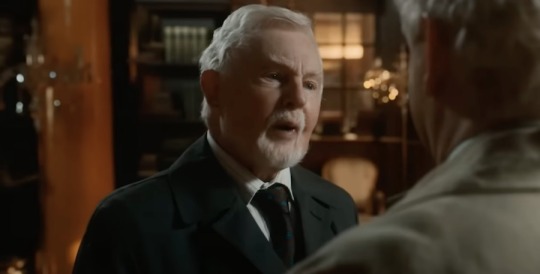
#good omens#the metatron#metatron#good omens 2#go metas#tarot#archangels#archangel fucking gabriel#archangel gabriel#archangel uriel#archangel michael#archangel sandalphon#good omens costumes#go costumes#youtube#metatron is a demon
176 notes
·
View notes
Text
I'm not the first to mention this, but one bit that I thought was really clever in Steven Universe is the ways in which the show subtly justifies the cartoonism of the principle cast always wearing the same outfit for ease-of-animation purposes. The gems are a gimme in that they're all hardlight-projections, and even before that's solidified as a plot point they're otherworldly and superheroic enough that you don't really think to question it. But Steven canonically just owns hundreds and hundreds of those star shirts, which are leftover merchandise from his father's fizzled-out career as a rock star. Into which you can read a whole bunch of other stuff if you really want to, right? And I do want to. It's reflective of Greg's misplaced optimism that he got hundreds of those made in the first place, and it's a benign but visible example of how Steven's life is shaped by the knock-on effects of decisions his parents made before he was even alive. He's got his mother's superpowers and he's wearing his father's shirts.
#steven universe#steven universe analysis#greg universe#thoughts#meta#su#contrast Connie who actually does have a range of diverse outfits#and tastes in outfits which evolve over the show!#because she's part of Steven's Universe#but she has somewhere to go home to
28K notes
·
View notes
Text
crowley must have known that aziraphale was also in love with him, he tidied the bookshop, he was planning on taking him to the Ritz after his confession, he had their song queued in the car these are not acts of someone who wasn't sure what the outcome will be.
which makes it so much more painful that he still confessed his love for aziraphale with tears in his eyes and on the verge of a full blown panic attack, he left saying "don't bother" but he still waited by his car til the elevator doors closed. all because

#alex says things#I’m going to jump off a cliff btw#good omens#ineffable husbands#good omens season 2#aziraphale#crowley#aziracrow#good omens meta
22K notes
·
View notes
Text
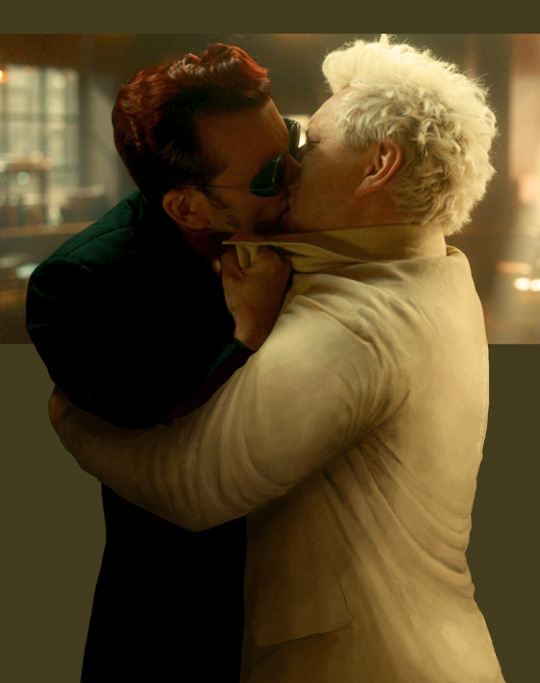
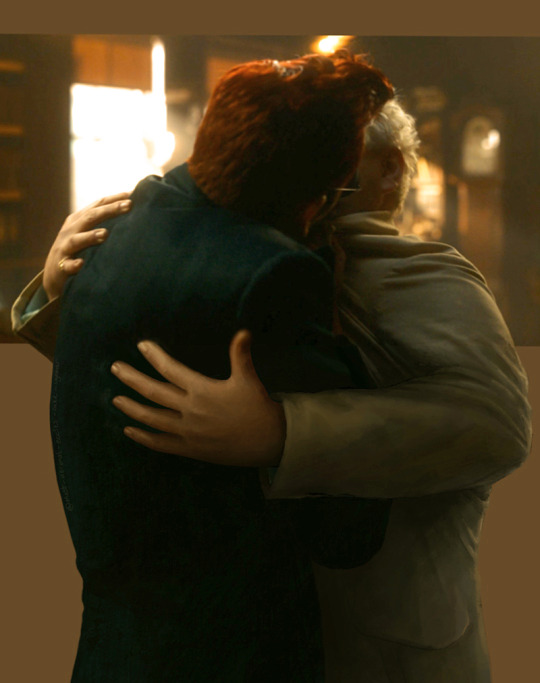
The products of trying to recreate what was going on outside the frame during the kiss. (for ENTIRELY SCIENTIFIC purposes)
@actual-changeling altered my whole outlook on life with this post about Aziraphale's left hand (I'd only been looking at his right hand) and I couldn't stop thinking about it, so I painted the rest of the fucking owl (and his bf).
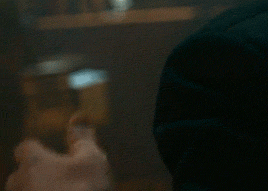
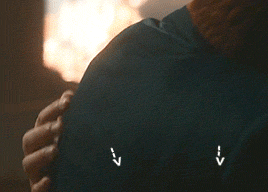
so normal about this
#good omens fanart#ineffable fanart#crOWLey#aziraphale#good omens 2#good omens#lord gaiman stokes the fires of our creativity#bless also michael sheen and david tennant#i think I’ve earned my eye dropper tool merit badge#now I can go back to sobbing and writing the aziraphale meta#good omens s2e6#aziracrow#crowley x aziraphale#good omens 2 spoilers#go2 spoilers#good omens spoilers
19K notes
·
View notes
Text
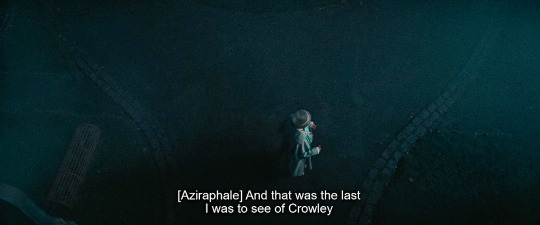
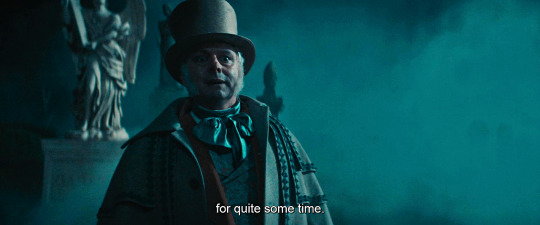
The fact that Aziraphale emerges from this flashback
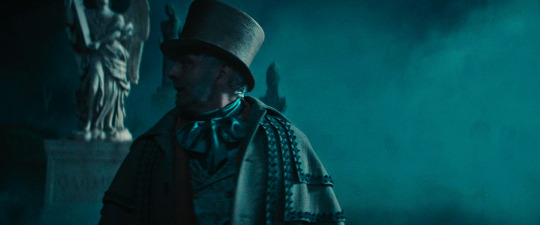
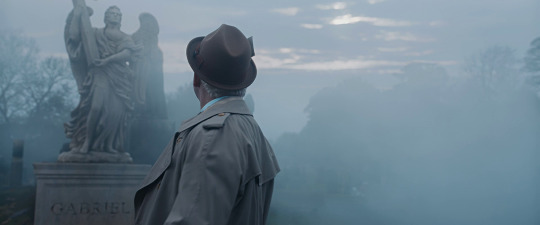
Makes this face
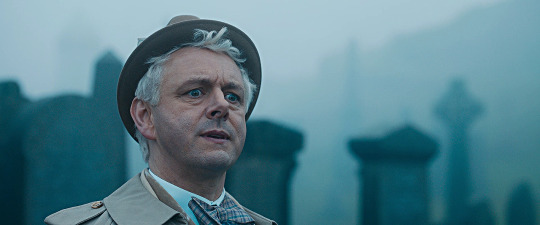
and then with a ginormous gap on the right side of the screen, proceeds to be like "I must call Crowley right now immediately."
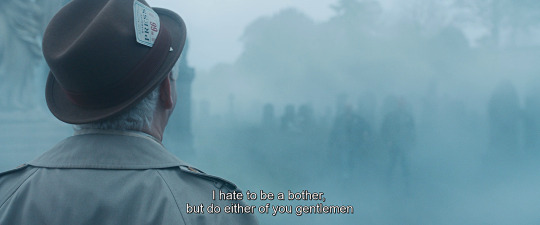
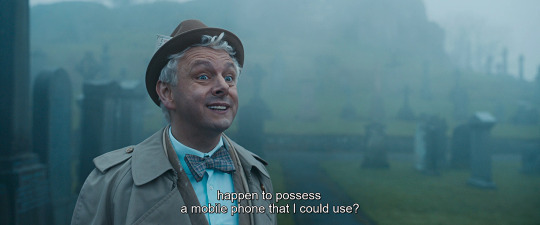
#I believe that Aziraphale in s2 is just as worried as Crowley is#he's just shoving it as far as possible under his little hat#good omens 2#v watches good omens#Aziraphale#I Know Where I'm Going#The Resurrectionists#i am this close to analyzing the screen composition during their phonecall because it's. interesting.#started thinking about this scene when they mentioned changing the weather based on Aziraphale's mood#good omens meta#more in the notes
11K notes
·
View notes
Text
I get that the bookshop fire was traumatic for Crowley because he thought he lost Aziraphale.
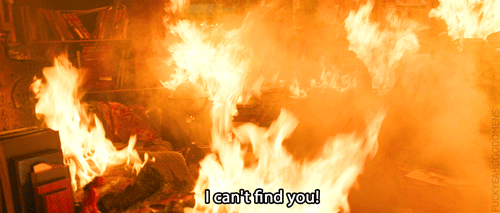
I keep seeing people say they want Aziraphale to know what it would feel like to lose Crowley, but I'm pretty sure my eyes weren't the only ones open when this happened...
Right?

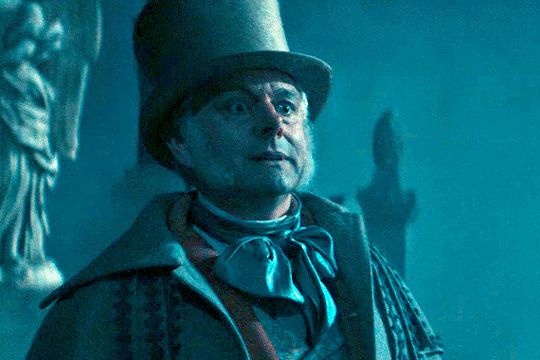
"And that was the last I was to see of Crowley for some time."
Aziraphale has lost Crowley. To Hell.
He could do nothing to stop what happened in Edinburgh, and I can't imagine that he didn't fear he'd lost Crowley for good here.
Aziraphale has experienced more heartbreak than some fans care to even acknowledge. He exists in constant fear of losing Crowley to Hell again. AGAIN.
We saw Aziraphale save Crowley from Hell in 1941 with the human magic trick he used on Furfur.
Aziraphale was the one sitting in the bathtub of holy water after the Notpocalypse, knowing this was the reason he'd been so scared to hand Crowley his own thermos of holy water in the first place.
He's lost Crowley to Hell before and he will do anything to prevent it from happening again.
That's the impact Edinburgh had on Aziraphale. This is the impact that losing Crowley had on Aziraphale.
#good omens#good omens meta#aziraphale#crowley#ineffable spouses#aziraphale defense squad#stop underestimating this badass angel#he's going to make the metatron regret the day he separated aziraphale from crowley
5K notes
·
View notes
Text
I think what's so interesting about Gideon as a narrator at the anniversary dinner is the fact that there's clearly tensions that she's just not picking up on because she's only there to eat a dessert.
But these people are all the immensely powerful leaders of the Houses and consider themselves to be in competition for literal godlike powers and the favour of the emperor.
There's so many little snippets that are potentially intriguing: why is Teacher trying to prime the Ninth to consider the Fifth a threat? Why are the Third and the Sixth "sizing each other up like prizefighters"? The Fifth absolutely knew what they were doing when they sat the teen heads of the opposing cults near each other.
Through Gideon's lens, Magnus' speech is a little awkward jokey thing. But...the seneschal of the House that is known to be actively trying to absorb another House is saying it's such a shame they're all so remote from each other and what do they all have in common (and it's so quiet you "could have heard a hair flutter to the floor") - that had to feel a bit different to people who aren't Gideon.
Palamedes' is dissecting the meaning of "Master Warden" and at one point compares it to a prison warden. 'Dulcinea' asking about whether Magnus and Abigail have children is perhaps less small talk and rather more pointedly political. Harrow's apparently stilted conversation with Protesilaus is clearly her actually probing his limitations like he's a bad Chat GPT-run chatbot.
And then 'Dulcinea' tells Gideon she liked the dinner because it was "useful". In her typical "I never lied to you" way, Cyth wasn't lying when she said Abigail had to die because of her hobby - Abigail Pent let loose on the Facility would have risked blowing Cyth's cover sky high. But what does a Canaan House look like where after the dinner party, the Fifth go down to the facility, get a key, and survive to continue their 'the Houses are going to get along or else' agenda? We've seen Fifth House soft power on a smaller scale in HTN: and it looks like inviting a teenager round for coffee, lulling her into a false sense of security with small talk, and then physically preventing her from leaving the room until she does what you want, while smiling the entire time. A series of little coffee chats could probably have led to a lot of cooperation in Canaan House, one way or another.
Gideon jokes about Silas marrying Ianthe because of their similar colour pallete, but it does raise the fact that there seems to be some tension around the Third, its succession, and the *point* of Ianthe. Why is Silas openly saying Ianthe should have died at birth? Combined with Judith's comments in the Cohort Intelligence Files about succession on the Third, it feels like there's something else being said here that Gideon isn't picking up on.
And of course, Harrow wasn't the only one desperate to become a Lyctor because her con was unsustainable. Presumably at some point Corona and Ianthe would be expected to marry, or at least take on more separate roles as Corona prepared to take over the throne and Ianthe was funneled off elsewhere. At some point, their package deal would have become unsustainable and Corona's cover would have been blown. But much as Harrow wants to become a Lyctor so she can reveal the state of the Ninth without repercussions, Ianthe is probably in part motivated to become a Lyctor for the same reason. Because otherwise, what would Ianthe's expected role have been? Amidst the suggestion of anxiety about the Idan succession, the dinner party also presents the fact that the reason Abigail and Magnus' infertility isn't a succession crisis for the ruling family of the Fifth is that Abigail's younger brother dutifully married in his early 20s and had kids. We know there are branch families in Ida - Babs is from one. He may be a prince, but he's not treated well, and you do get the sense that the stakes to stay in power in Ida are high.
We don't learn anything about the political situation in the Houses themselves during HTN or NTN, but in the wake of Canaan House, you have to suspect there are a number of tensions and concerns.
#the locked tomb#tlt meta#Is Ianthe's “going to see a man about a queen” seeing to the political situation back home in Ida?#Which must have been devastated by her ascension and Corona's apparent death?
4K notes
·
View notes
Text
Aziraphale’s Choice, the Job Connection, and Michael Sheen’s Morality
Update: Michael Sheen liked this post on Twitter, so I'm fairly certain there is a lot of validity to it.
I’ve had time to process Aziraphale’s choice at the end of Season 2. And I think only blaming the religious trauma misses something important in Aziraphale’s character. I think what happened was also Aziraphale’s own conscious choice––as a growth from his trauma, in fact. Hear me out.
Since November 2022 I’ve been haunted by something Michael Sheen said at the MCM London Comic Con. At the Q&A, someone asked him about which fantasy creature he enjoyed playing most and Michael (bless him, truly) veered on a tangent about angels and goodness and how, specifically,
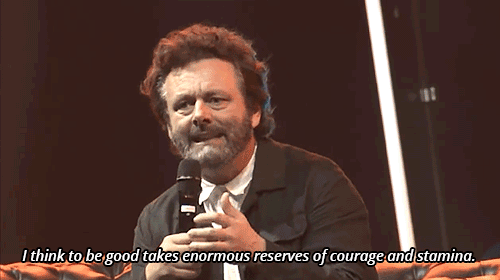
We as a society tend to sort of undervalue goodness. It’s sort of seen as sort of somehow weak and a bit nimby and “oh it’s nice.” And I think to be good takes enormous reserves of courage and stamina. I mean, you have to look the dark in the face to be truly good and to be truly of the light…. The idea that goodness is somehow lesser and less interesting and not as kind of muscular and as passionate and as fierce as evil somehow and darkness, I think is nonsense. The idea of being able to portray an angel, a being of love. I love seeing the things people have put online about angels being ferocious creatures, and I love that. I think that’s a really good representation of what goodness can be, what it should be, I suppose.
I was looking forward to BAMF!Aziraphale all season long, and I think that’s what we got in the end. Remember Neil said that the Job minisode was important for Aziraphale’s story. Remember how Aziraphale sat on that rock and reconciled to himself that he MUST go to Hell, because he lied and thwarted the will of God. He believed that––truly, honestly, with the faith of a child, but the bravery of a soldier.
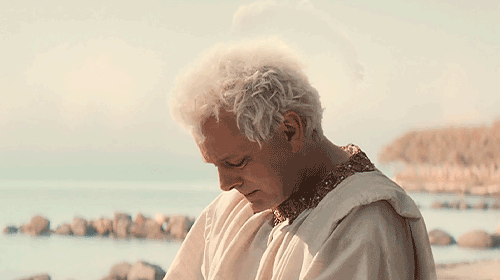
Aziraphale, a being of love with more goodness than all of Heaven combined, believed he needed to walk through the Gates of Hell because it was the Right Thing to do. (Like Job, he didn’t understand his sin but believed he needed to sacrifice his happiness to do the Right Thing.)
That’s why we saw Aziraphale as a soldier this season: the bookshop battle, the halo. But yes, the ending as well.
Because Aziraphale never wanted to go to Heaven, and he never wanted to go there without Crowley.
But it was Crowley who taught him that he could, even SHOULD, act when his moral heart told him something was wrong. While Crowley was willing to run away and let the world burn, it was Aziraphale (in that bandstand at the end of the world) who stood his ground and said No. We can make a difference. We can save everyone.

And Aziraphale knew he could not give up the ace up his sleeve (his position as an angel) to talk to God and make them see the truth in his heart.
I was messed up by Ineffable Bureaucracy (Boxfly) getting their happy ending when our Ineffable Husbands didn’t, but I see now that them running away served to prove something to Aziraphale. (And I am fully convinced that Gabriel and Beelzebub saw the example of the Ineffables at the Not-pocalypse and took inspiration from them for choosing to ditch their respective sides)
But my point is that Aziraphale saw them, and in some ways, they looked like him and Crowley. And he saw how Gabriel, the biggest bully in Heaven, was also like him in a way (a being capable of love) and also just a child when he wasn’t influenced by the poison of Heaven. Muriel, too, wasn’t a bad person. The Metatron also seemed to have grown more flexible with his morality (from Aziraphale's perspective). Like Earth, Heaven was shades of (light?) gray.
Aziraphale is too good an angel not to believe in hope. Or forgiveness (something he’s very good at it).
Aziraphale has been scarred by Heaven all his life. But with the cracks in Heaven’s armor (cracks he and Crowley helped create), Aziraphale is seeing something else. A chance to change them. They did terrible things to him, but he is better than them, and because of Crowley, he feels ready to face them.
(Will it work? Can Heaven change, institutionally? Probably not, but I can't blame Aziraphale for trying.)
At the cafe, the Metatron said something big was coming in the Great Plan. Aziraphale knows how trapped he had felt when he didn’t have God’s ear the first time something huge happened in the Big Plan. He can’t take a chance again to risk the world by not having a foot in the door of Heaven. That’s why we saw individual human deaths (or the threat of death) so much more this season: Elspeth, Wee Morag, Job’s children, the 1940s magician. Aziraphale almost killed a child when he couldn’t get through to God, and he’s not going through that again.
“We could make a difference.” We could save everyone.

Remember what Michael Sheen said about courage and doing good––and having to “look the dark in the face to be truly good.” That’s what happened when Aziraphale was willing to go to Hell for his actions. That’s what happened when he decided he had to go to Heaven, where he had been abused and belittled and made to feel small. He decided to willingly go into the Lion’s Den, to face his abusers and his anxiety, to make them better so that they would not try to destroy the world again.
Him, just one angel. He needed Crowley to be there with him, to help him be brave, to ask the questions that Heaven needed to hear, to tell them God was wrong. Crowley is the inspiration that drives Aziraphale’s change, Crowley is the engine that fuels Aziraphale’s courage.
But then Crowley tells him that going to Heaven is stupid. That they don’t need Heaven. And he’s right. Aziraphale knows he’s right.
Aziraphale doesn’t need Heaven; Heaven needs him. They just don’t know how much they need him, or how much humanity needs him there, too. (If everyone who ran for office was corrupt, how can the system change?)
Terry Pratchett (in the Discworld book, Small Gods) is scathing of God, organized religion, and the corrupt people religion empowers, but he is sympathetic to the individual who has real, pure faith and a good heart. In fact, the everyman protagonist of Small Gods is a better person than the god he serves, and in the end, he ends up changing the church to be better, more open-minded, and more humanist than god could ever do alone.
Aziraphale is willing to go to the darkest places to do the Right Thing, and Heaven is no exception. When Crowley says that Heaven is toxic, that’s exactly why Aziraphale knows he needs to go there. “You’re exactly is different from my exactly.”
____
In the aftermath of Trump's election in the US, Brexit happened in 2018. Michael Sheen felt compelled to figure out what was going on in his country after this shock. But he was living in Los Angeles with Sarah Silverman at the time, and she also wanted to become more politically active in the US.
Sheen: “I felt a responsibility to do something, but it [meant] coming back [to Britain] – which was difficult for us, because we were very important to each other. But we both acknowledge that each of us had to do what we needed to do.” In the end, they split up and Michael moved back to the UK.
Sometimes doing the Right Thing means sacrificing your own happiness. Sometimes it means going to Hell. Sometimes it means going to Heaven. Sometimes it means losing a relationship.
And that’s why what happened in the end was so difficult for Aziraphale. Because he loves Crowley desperately. He wants to be together. He wanted that kiss for thousands of years. He knows that taking command of Heaven means they would never again have to bow to the demands of a God they couldn’t understand, or run from a Hell who still came after them. They could change the rules of the game.
And he’s still going to do that. But it hurts him that he has to do that alone.
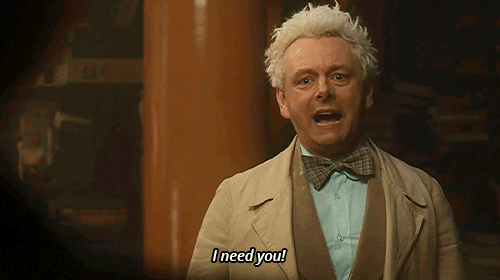
#good omens#good omens 2#ineffable husbands#it's kinda like capt america: civil war#with Azi as Tony Stark: traumatized and trying to do the right thing#and Crowley being Steve Rogers: fuck the establishment let's go rogue#gos2spoilers#good omens meta#good omens 2 meta#go s2#michael sheen#go s2 meta#go meta#*mine#*mymeta#ineffables husbands#ineffable soulmates#*mybest
11K notes
·
View notes
Text
The Eldritch Ball or Aziraphale's Macabre Danse
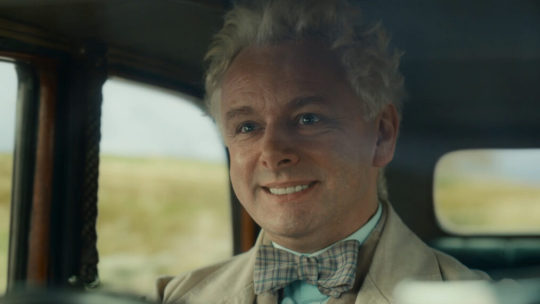
I'm a huge sucker for dark classical music (I'm using the term "classical" broadly, not referring to the specific period. Music-y folks, please forgive.) As such, Saint-Saëns's "Danse Macabre" is one of my all time favorite pieces. It's spooky. It's intentionally dissonant. It's even got a jump scare! Like, literally, the perfect piece of music.
youtube
The story behind "Danse Macabre" goes like this: Each Halloween at midnight, Death enters the graveyard with a fiddle. As he plays, the skeletons rise from the ground and dance through the cemetery, resurrected by Death's power and possessed by his instrument.

In S2 E3, the Bentley plays "Danse Macabre" as Aziraphale drives up to Edinburgh. "What do we do? We play classical music that stays classical music." (And the Bentley listens to him! Because the Bentley is an expression of Crowley's subconscious and wants to please him and make him happy...and I'm sure you can find lots of excellent metas to that end. Or maybe you have another theory about why the Bentley is so pliant toward the angel? I'd love to hear it. But that's not what I'm talking about right now. I'm just getting distracted.)
Why is this song so perfect for a bit of subtle foreshadowing and repeated metaphor? So glad you asked. I have reasons. And evidence. Please, peruse my wares.
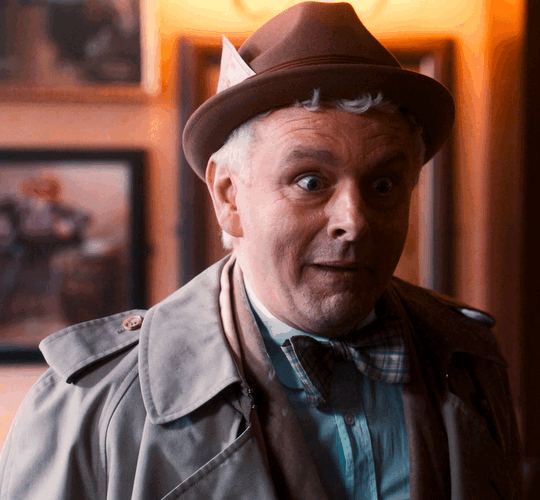
In the A Plot of this episode, Aziraphale travels to Scotland to visit a pub called The Resurrectionist. (Ya know, like Death? Like how Death resurrects people in the song? Okay, just wanted to really hit that nail into the coffin.) The pub is, of course, named for a certain Mr. (not Dr., he's a surgeon) Dalrymple, whom Crowley and Aziraphale meet in the accompanying flashback minisode entitled (you'll never guess) "The Resurrectionist." The minisode plot involves Crowley and his the angel encountering young Elspeth, a grave robber who, like Death, releases the bodies of the deceased from their earthly bonds of soil and stone. My interpretation is that Elspeth becomes Death incarnate, first in the process of using her instrument (her shovel) to resurrect the dead, and later when she inadvertently brings about the literal death of her partner, Wee Morag. Rather than allow Wee Morag's body to turn to dust in the ground, Elspeth "resurrects" her, selling her body to Dr. Dalrymple (sorry, Mr. Dalrymple, he's a surgeon, not a doctor), who will use Wee Morag's body for research, which will in turn save the lives of countless others by furthering the field of medicine. A form of resurrection, indeed. There's also the plot thread of Crowley and Aziraphale providing Elspeth with a nest egg to escape the cycle of poverty into which she has been born. This, too, is another form of re-birth. Or, say it with me, resurrection. Alright, you're getting it now.
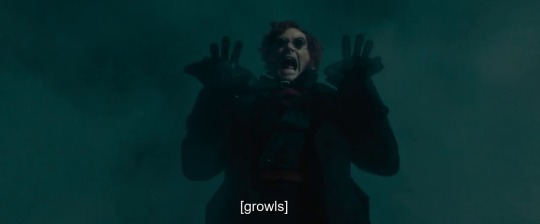
Okay, now I get to delve into the fun stuff. Let's talk about that cotillion ball, shall we? You know, that danse party where Aziraphale persuades all the shopkeepers on Whickber street to attend a Jane Austen-style ball?
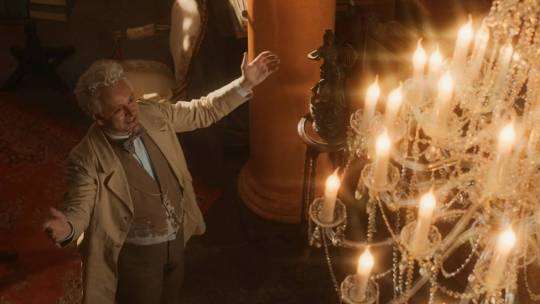
I personally refer to this whole fiasco experience as the Eldritch Ball. On the surface, it seems fairly innocent. The shopkeepers need a little bit of encouragement to attend the Whickber Street monthly meeting, but the angel manages to convince everyone to join with the help of some coercion-via-bribery. When they show up, they're transmuted into Austen-esque characters, from their clothes, to their speech patterns, even to some extent, their perception of reality. This is where it starts to get a little uncomfortable if you peel back the layers. Mrs. Sandwich can't talk about what she does for a living, which is a great comedy bit, but also demonstrates that her speech is being significantly censored and altered by an outside force. With the exception of Mr. Brown (hidden agendas here, Neil? I honestly don't know), all the shopkeepers find themselves in new, slightly-period-appropriate garments. What's really weird, though, is that no one notices the changes. When the dancing begins, to the music of Mr. Anderson's piano and an accompanying string quartet (strings...as in violins...as in fiddles. Remember Death's fiddle?), Nina appears to be the only one who realizes that something is off.
Maggie: This is something new.
Nina: This is something completely bonkers. Are we...? Why is everyone talking like they've escaped from Pride and Prejudice?
Maggie: Just getting into the spirit of things, I suppose.
Nina: The spirit of what things? This is meant to be the shopkeeper association monthly meeting.
Maggie: Hmm. Yes. Now that you put it like that...
Nina: Are we dancing?
Maggie: Yes.
Nina: Did you ever learn the steps to this dance?
Maggie: It's just what we do, isn't it?
Nina: No. No, it isn't. This is something mad. This is their [Crowley & Azirapahle's] fault. They're doing this.
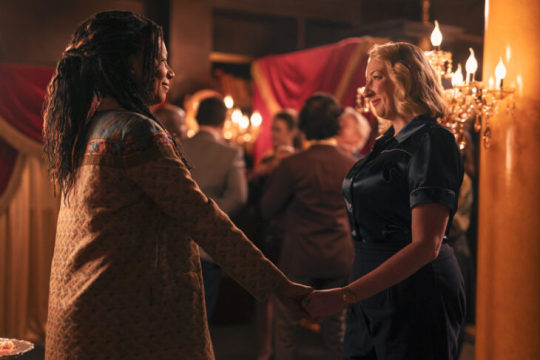
Something is definitely mad. One might even say it's macabre. Aziraphale has become Death the Resurrectionist. He has lured the shopkeepers of Whickber Street through a portal (as Death leads his flock from the world of the dead to the world of the living.) Aziraphale's instrument is his clipboard and pen, held almost as one might hold a fiddle and bow, as he invites the various shopkeepers to the monthly meeting. Once they all arrive, he miraculously gives them new clothes (as Death knits together the bones of the dead), and then proceeds to control their bodies and minds, as though they are merely marionettes. They dance and speak in the way Aziraphale imagines, fulfilling his fantasy of a perfect Jane Austen-style ball (quite literally, the Danse Macabre.)
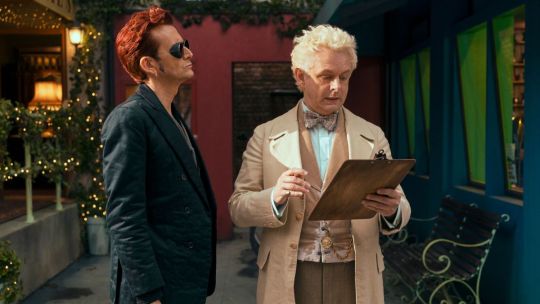
The shopkeepers have become the dead and Aziraphale controls them until the spell is broken--or rather until the window is broken.
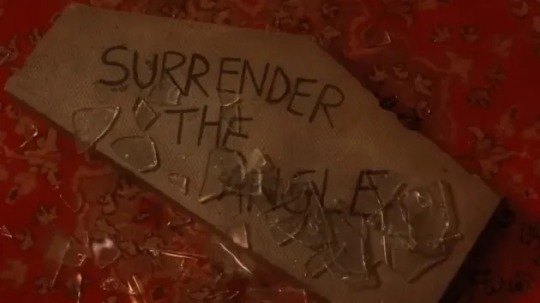
To be honest, I don't think Aziraphale is really aware of how much he is able to transfigure his environment, including the humans who happen to be close by. Or, at least, I don't believe he does any of this with ill intent. He's just a bit blind to anything outside his fixation of wooing Crowley, at the moment. As a result, he creates a situation that is profoundly problematic and unnatural. Just like the dead in the graveyard have no agency when Death plays his fiddle, the Whickber Street shopkeepers are possessed by Aziraphale's intricate romantic fantasy and must dance as long as the music plays.
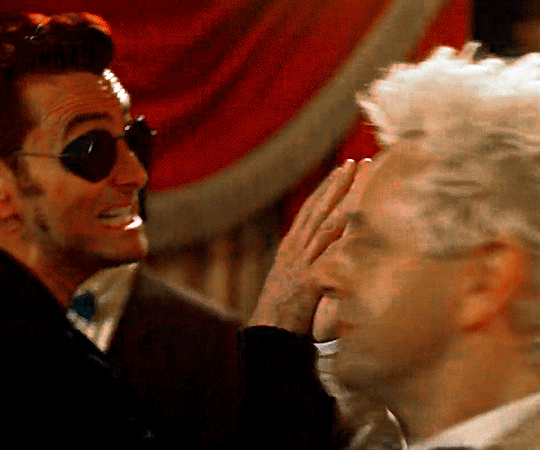
It is, in fact, only when the music stops, that the shopkeepers begin to realize that something is most certainly weird. The diagetic music (Mr. Anderson & Co.) abruptly cuts off when an approaching demon horde tosses a brick through the bookshop window. Now the spell, or in this case, miracle, begins to break down. While the shopkeepers still appear to be somewhat under the influence of Aziraphale's persuasive aura, a few of them glance down at their clothes in confusion and look around the bookshop, as though waking from a dream. And at this point, after a little finagling, Crowley escorts the humans out of the bookshop and out of Aziraphale's Danse Macabre.
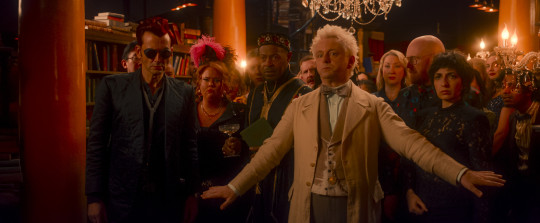
Once the demons attack the bookshop Aziraphale's influence on his surroundings really starts to deteriorate. Throughout the season, he's been able to structure and manipulate reality (sometimes with Crowley's help) to suit his needs: protecting Gabriel, altering the Bentley, organizing the Ball, etc. But once the bookshop, his safe space, has been breached, he loses control of the situation. From this point in the narrative, nothing goes according to Aziraphale's plan. Aziraphale wants to protect Jimbriel, but the former archangel insists on giving himself over to the demons. Crowley leaves and Aziraphale has to defend the bookshop on his own, when he'd expected Crowley to come right back and save him. While defending the bookshop, Aziraphale reaches his "last" resort not once, but twice: first allowing Nina and Maggie to use his books (!!!) as weapons and then blowing up his halo in a last ditch effort to fend off the invaders. This was not on the agenda for today!
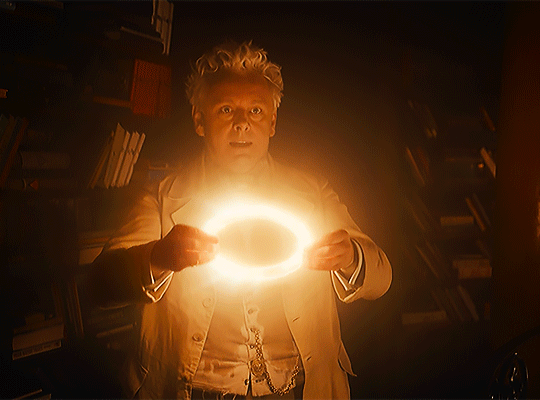
Things just continue to go downhill from there, Aziraphale losing all control of the situation. And by the time the Final Fifteen wraps up, the angel has lost his bookshop and possibly his most important relationship. By the end of the season, Aziraphale is no longer Death the Resurrectionist, the manipulator and puppeteer. Now the angel has become the puppet, dancing to Heaven's music.
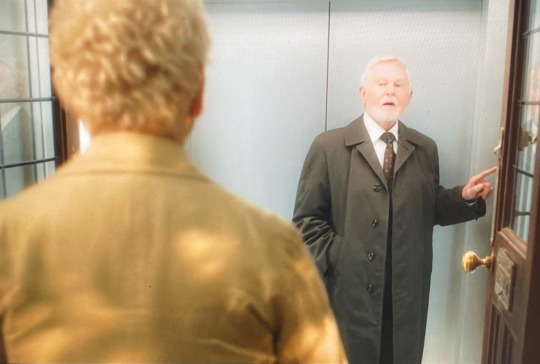
#good omens#aziraphale#aziracrow#crowley#go metas#good omens meta#danse macabre#camille saint saëns#the bentley#nina and maggie#eldritch ball#elspeth#wee morag#dark music#Youtube
107 notes
·
View notes
Text
Anybody else ever lie awake and think about how they placed plant photographs in the kitchen behind David Tennant, and removed the background behind Michael Sheen for the last shot of Staged so that it would look exactly like the last shot of Good Omens? Just me? Okay.

Good Omens Season 2, Episode 6 (2023)

Staged Season 3, Episode 6 (2022)
-------------------------------------
Thanks for rewatching it with me @ghstptats @embracing-the-ineffable @thebluestgreen! Xx
#good omens meta#good omens 2#art director talks good omens#go season 2#go meta#good omens season 2#good omens#staged#david and michael#bbc staged#michael sheen#david tennant
3K notes
·
View notes
Text
I just realised we’ve all just assumed that Xie Lian looks at the wraith butterflies and assumes they are beautiful and ethereal because they are soft with him and not weapons but I think we are forgetting this guys special interest is swords and weapons in general he could probably sense just how deadly they were and that only made them more beautiful to him.
#I love him he’s a freak he would see flying knives and go prettyyyyy#tgcf#tian guan ci fu#xie lian#hualian#Xie Lian meta#tgcf meta#zee rambles
3K notes
·
View notes
Text
the whole "it's boring to have the characters end up in heaven at the end" like, no it's not a boring ending and it's not what happened. they aren't in heaven, they are back inside of jughead's narration. they're teenagers forever. they're inside the story again. this whole season has had each and every character fighting their way out of the narrative they have been trapped inside, that jughead trapped them in, let them finally achieve that and gain their freedom only to die and end up back in the narrative again. they are back where they started.
7K notes
·
View notes
Text
Is that. A Nightingale????
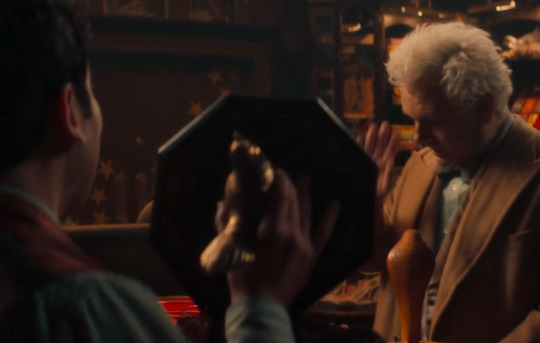
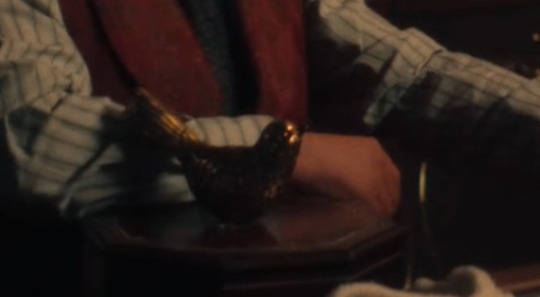
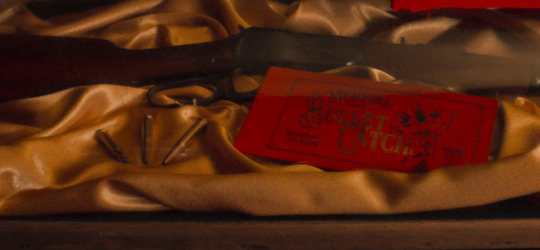
"I'm afraid that's not for you, sir. What about this?", Goldstone asks while showing Aziraphale a case with a bronze nightingale as a handle. "No, no, no, it's alright. I've found my showstopper.", Aziraphale answers, looking at the magic bullet catch.
Is Aziraphale actually choosing a RIFLE over a Nightingale in this scene. I am losing it.
Not only is he choosing danger over the safe option, he's choosing a weapon. HE IS CHOOSING TO FIGHT.
And, he is also choosing to do this with Crowley (even though Crowley is reluctant) and he is choosing to trust him. He's not even considering the safe option.
#good omens#crowley#aziraphale#ineffable husbands#good omens 2#good omens spoilers#good omens theory#good omens thoughts#good omens meta#not art#sorry this is not an art post but I had to scream these thougts out into the void#im going up the walls
3K notes
·
View notes
Text
Green Arrow, Batman, and a civilian named Daniel Fenton get sucked into the Realm between Realms.
This would be easy to resolve, but the civilian keeps running away.
Danny has heard...things. About Batman.
He collects children, black haired ones, and makes them his Robins. Danny doesn't want to be adopted! He's got two perfectly fine mad scientists for parents, and they love him very much!
Also he's bantering with Green Arrow like they're a married couple, so Green Arrow is totally in on it. Whatever "it" is.
He's convinced that a goody-two-shoes like Batman will rat him out if he goes ghost, so he's gotta stay civilian.
So he runs from both of them as a civilian, using every trick he knows to disappear out of sight long enough to go invisible.
Unfortunately, they're persistent, and even if they can't see him that doesn't stop them from stampeding through the Realms in search of him.
#dpxdc#dcxdp#dp x dc#dc x dp#phanfic#story prompt#bruce knows the kids a meta straight up#like the second he disappeared and then couldn't be found at all?#bruce knew#ollie knew too#they just wanna grab the kid and go home#but danny's not having it no sir#he has no desire to be forcibly adopted when his mom is expecting him home for dinner#fuck that
1K notes
·
View notes
Text
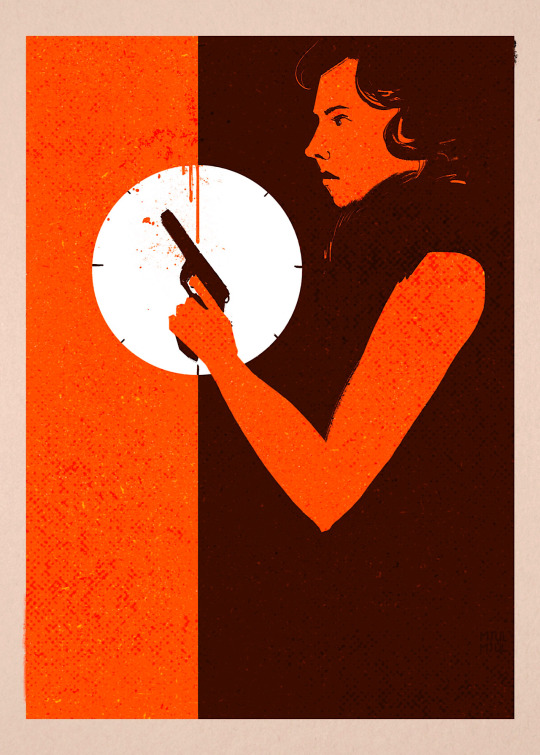
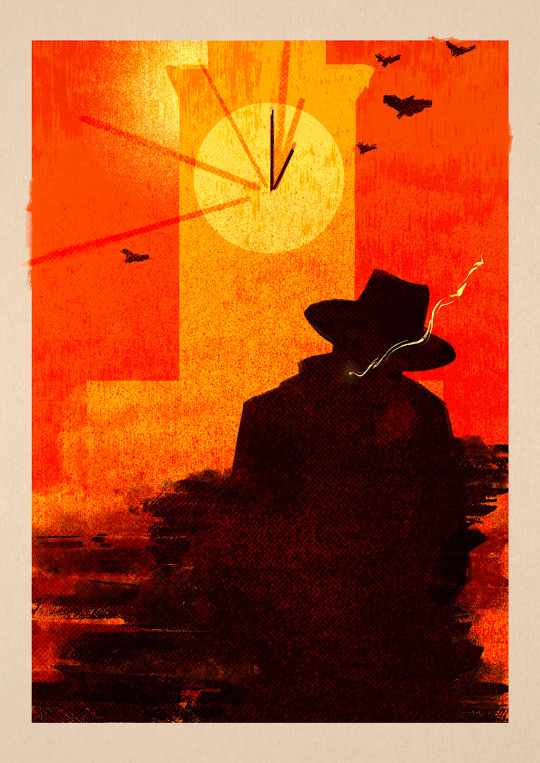
Katya / Goncharov
#yeah ik ive posted them before sorry but i REALLY like how these look together#martin scorsese#goncharov#artists on tumblr#illustration#unreality#<— posters for a ‘movie’ that doesn’t actually exist but is a tumblr meme in which everyone pretends it does&makes content for it#fascinating how we’re immediately personable w katya by knowing her first name while only knowing goncharov’s surname keeps us at a distanc#combined with him being the only major character to go by a moniker it emphasizes just how much he's been consumed by the role he plays#who is goncharov? does he know and keep it secret? or has he too lost his sense of identity?#it's reflected in these posters as we SEE katya but goncharov remains elusive - yet clearly time is running out for them both#lakjdklf ok im done now i never post meta on here so im having fun with the fictional movie#btw I updated both of the illustrations compared to the original posts but will leave those as they were#woudl be cool if my post showed up. u can do it tumblr
21K notes
·
View notes
Text
I see a lot of people clowning on the people of Pelican Town for not repairing the community center themselves or clowning on Lewis for embezzling and. like. Those criticisms aren't entirely unfair. But I think instead of coming at it from a perspective of "why can't the townspeople do this" we should be asking "why and how can the farmer do this?"
Like. Think about it. The farmer arrives in Stardew Valley on the first day of spring. By the first day they're obviously different. By day five the spirits of the forest who haven't been seen by the townsfolk in years or generations are speaking to them. By the second week they've developed a rapport with the wizard that lives outside town.
In the spring they go foraging and find more than even Linus, who's spent so many years learning the ways of the valley. Maybe he knows, when he sees them walking back home. Maybe he looks at them and understands that they're different, chosen somehow.
In the summer they fish in the lakes and the ocean for hours on end, catching fish that even Willy's only ever heard of, fish that he thought were the stuff of legend. They pull up giants from the deep and mutated monstrosities from the sewers.
In the fall, their crops grow incredibly immense; pumpkins twice as tall as a person, big enough that someone could live inside. The farmer cuts it down with an axe without even batting an eye. Does Lewis wonder, when he checks the collection bin that night and finds it full to the brim with pumpkin flesh? What does he think? Does he even leave the money? Does he have the funds to pay the farmer millions of dollars for the massive amounts of wine they sell? Or is it someone--something--else entirely?
In the winter, the farmer delves into the mines. No one in Pelican Town has been down there in decades. No one in living memory has been to the bottom. The farmer gets there within the season. They return to the surface with stories of dwarven ruins and shadow people, stories they only tell to Vincent and Jas, whose retellings will be dismissed by the adults as flights of fancy. People walking by the entrance to the mines sometimes hear the farmer in there, speaking in a language no one can understand. Something speaks back.
The farmer speaks to the the wizard. They speak to the spirit of a bear inside a centuries-old stone. They speak to the shadow people and the dwarves, ancient enemies, and they try to mend the rift. They speak to the Junimos, ancient spirits of the forest and the river and the mountain. They taste the nectar of the stardrops and speak to the valley itself. They change Pelican Town, and they change the valley. Things are waking up.
And what does Evelyn think? She's the oldest person in the valley; she was here when the farmer's grandfather was young. (How old *is* she, anyway? She never seems to age. She doesn't remember the year she was born.) Does she see the farmer and think of their grandfather? Does she try to remember if he was like this too, strange and wild and given the gifts of the forest?
And does their grandfather haunt the valley? He haunts the farm, still there even after his death; his body died somewhere else, but his spirit could never stay away for long. Does Abigail, using her ouija board on a stormy night, almost drop the planchette when she realizes it's moving on its own? Does Shane, walking to work long before anyone else leaves their house, catch glimpses of a wispy figure floating through the town? Does the farmer know their grandfather came back to the place they both love so much?
Mr. Qi takes interest in the farmer. He's different, too; in a different way, maybe, but the principles are the same. They're both exceptional, and no matter what Qi says about it being hard work and dedication, they both know the truth: the world bends around the both of them, changing to fit their needs. Most people aren't visited by fairies or witches. Most people don't have meteorites crash in their yard. Most people couldn't chop down trees all day without a break or speak to bears and mice and frogs.
The farmer is different. The rules of the world don't work for them the way they work for everyone else. The farmer goes fishing and finds the stuff of fairy tales. The farmer goes mining and fights shadow beasts and flying snakes. The farmer looks at paths the townspeople walk every day and finds buried in the dirt relics of lost civilizations.
The farmer is a violent, irrepressible miracle, chosen by the valley and destined to return to it someday. Even if they'd never received the letter, they would've come home.
They always come home eventually.
#lich says shit#stardew valley#sorry for the stardew valley meta i'm just so obsessed with how FREAKY the farmer is. Like it's so fun#gonna write another long ass post about the farmer's bloodline specifically and. like.#why did their grandpa leave the valley?? why did their parents never go back??#stardew valley farmer#sdv
1K notes
·
View notes